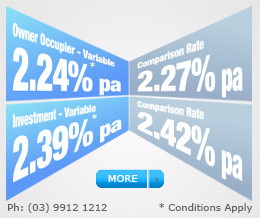Our Lenders
Home Loan Jargon
Agent's Commission
The fee to the real-estate agent for selling the property.
Appraised Value
Estimate of the value of a property being used as security for a home loan. This is for lending purposes only.
Appreciation
An increase in value of an asset such as an existing property or block of land.
Body Corporate
A corporation of the owners of units or townhouses within a strata building. They form a self-elected council to manage the block and maintain common areas.
Bridging Finance
Short-term finance that covers the gap between the purchase of a new property and the sale of an old property.
Capital Gain
Profit from selling an asset at a higher market price than it cost.
Capital Gains Tax
A Federal Government tax on the monetary gain made on the sale of an asset bought and sold after September 1985.
Capped Rate
Usually for a set number of months/years where the interest rate can go up and down but there is a maximum (capped) interest rate which it cannot go above.
Caveat
Notification placed on a title to warn any purchaser that someone else holds an interest in the property. This ensures it is not sold without the consent of this third party.
Caveat Emptor
Latin for ‘let the buyer beware’. In other words, the buyer has the responsibility to examine the goods being purchased.
Certificate of Title
Records your ownership of a piece of property.
Cooling-Off Period
The amount of time either the buyer or seller has to change their minds in a private sale. this doesn’t apply if you buy or sell at auction.
Common Property
A part of the property that is for the use of all tenants.
Comparison Rate
An adjusted interest rate that takes into account the lenders' fees and charges over the term of the loan.
Contract of Sale (Referred to as the "Contract"):
A legal document which sets out the terms and conditions the seller and the buyer enter into when a sale is to take place - the contract contains a description of the property
Conveyance
A legal document by which the ownership of property is transferred.
Deposit Bond
A guarantee that can be used instead of having to provide cash for the 10% deposit on a property purchase.
Disbursements
Miscellaneous fees and charges incurred during the conveyancing process, including search fees charged by Government authorities.
Duty
A state government tax on financial transactions. For the sale of real estate, it is calculated according to the sale value. It also applies to the mortgage.
Equity
The difference between the value of your home and the amount that is owed on your home loan.
Exchange of Contracts
When the buyer and seller swap contracts of sale.
Fittings
Items that can be removed from the property, such as furniture.
Fixed Rate
The rate is fixed for a specific number of years, so you know what your payments will be over that period. Following this period, the rate will usually revert to the lender's standard variable rate.
Fixtures
Items that are part of the property, such as baths, dishwashers and curtain rods.
Freehold
Freehold land is land that is not leased from the Crown (government).
GST
A 10% consumption tax levied on the final consumer of the goods or services.
Guarantor
A promise by a third party to meet a borrower’s payment obligations if they are unable to pay. It is often secured by the guarantor’s own property.
Holding Deposit
A refundable goodwill deposit to show a buyer's intention to purchase.
Home Equity Loan
A loan which allows you to access the equity that you have built up in your home.
Inclusions
Items included in the property, such as light fittings, which should be listed in the contract.
Interest-Only Loan
The borrower only pays interest on the loan over a pre-determined period, e.g. 5 years, instead of interest plus principal. At the end of the period, the loan usually reverts to principal and interest for the remainder of the loan’s term.
Land Tax
An annual tax paid to the state government, calculated according to the value of the property.
Leasehold
A leaseholder holds the title to land only for a finite term i.e. the length of the lease upon payment of a consideration e.g. rent.
Lender
The actual company that provides the finance to satisfy a loan or mortgage request.
Lender's Mortgage Insurance
Paid by you to the lender to ensure that the lender is covered if you default on your repayments and they suffer a monetary loss if they have to sell your home, e.g. the sale price is insufficient to cover the home loan debt. If this occurs, the insurer will then approach the borrower for the difference.
Line of Credit
A transaction account that has a credit limit attached to it. The borrower can generally withdraw funds at any time, up to the credit (or facility) limit. There is usually no fixed repayment schedule however the borrower is usually required to make payments to at least cover the interest and fees on the loan.
LVR
Loan to value ratio. This is the size of the loan or mortgage as a percentage of the value of the property or pricecbeing paid for the property e.g. A property valued at $50,000 with a mortgage of $45,000 would have an LVR of 90%.
(Mortgage/Finance) Broker
An intermediary who identifies, and places, customers requiring a loan or mortgage etc. with a company (Lender) able to provide it. The broker often carries out the administration to do with processing the loan.
Mortgage Document
The document recording that a property is security for the money borrowed to purchase it.
Mortgage (amortising or reducing)
The principal and interest type loan which is the most common form of housing loan. The repayments through the term of the loan include both interest and principal.
Mortgage (Fixed or interest only loan)
The amount borrowed is not repaid until the end of the term of the loan. Repayments made are only payments of interest.
Negative Equity
The situation where the amount owed on a mortgage exceeds the value of the property.
No Insurance
Insurance is offered to provide peace of mind against life's unexpected problems which invariably occur. Selecting "No insurance" means that you are choosing not to protect your proposed loan repayment in the eventcof you being unable to work due to an accident, sickness or redundancy.
Negative Gearing
When the tax deductions from an investment property exceed the income the property generates, the investor has a tax loss to offset against their other taxable income.
Non Conforming Lender
Mortgagee who assists those unable to borrow money secured on a property from a normal lending source.
100 per cent Offset Account
A savings account linked to your home loan which can help to reduce the amount of interest payable on the loan.
Off-The-Plan
Buying a property prior to construction taking place.
Option
A legal method by which a purchaser may reserve a property for a period of time under mutually agreed terms. This sometimes includes financial penalties, so discuss with a solicitor before entering into any option arrangement.
Passed In
When a property fails to sell at auction, it is said to be 'passed in’ at the highest bid.
Principal
The amount of money owed to a lending authority
Private Treaty Sale
A real-estate agent finds a buyer without going to auction. A price is set and prospective purchasers can submit offers that are usually below the asking price.
Rei Contract
Standardised ‘plain English’ contract used as the basis for home and land transactions. Can be amended with special clauses to suit buyers and sellers.
Redemption Penalties
When a loan is redeemed (paid off) early, either in full or in part, many lenders will charge a fee. This particularly applies to Fixed, Discounted or Capped rate loans or mortgages.
Redraw Facility
Feature of a loan that allows borrowers to access any additional repayments they have made.
Reserve Price
The minimum price that the vendor will sell the property for at auction.
Stamp Duty - Mortgage
A tax paid on the loan amount. Is payable on refinancing, however most states provide a refund and only charge on the up stamped amount.
Stamp Duty - Property
A tax paid on the purchase of properties.
Search (Title)
The process of investigating or examining title to land to ascertain if the seller has the right to transfer ownership. A title search reveals the names of the owners and the other precise details of the property such as the existence of any restrictive covenant, mortgage or caveat on the title.
Semi-Detached
A house that shares a common wall with another house.
Settlement
Money paid in full in exchange for title documents, keys and the right to take possession.
Strata Title
The concept of ‘layer upon layer’ - lots, stacked one on top of the other, e.g. a block of units. Each unit relates to a ‘lot’ in the Strata Plan.
Term
The length of time over which a home loan is repaid, generally 25 or 30 years.
Term Deposit
A type of savings account where the size of the deposit, the interest rate, and the length of time the money is deposited for, are all fixed.
Title Deeds
Formal documents signifying ownership.
Torrens Title
The system of title that applies to most land in Australia.
Transfer of Land Duty
A state government stamp duty on property purchases calculated on the purchase price.
Unencumbered
Describes a property free of mortgages, covenants, restrictions, etc.
Valuation
A report which details the value of your property.
Variable Interest Rate
A rate that varies in accordance with the rates in the marketplace.
VEDA
Veda is a credit reporting agency that enables business and individuals once authorised to access their potential customers credit history files, the checks provides invaluable insights into potential customers' relationships with other lenders giving you a comprehensive view of your customer's credit activity.
Vendor
The party offering a property for sale.
Zoning
Used by local authorities to control use of property, e.g. residential or retail.












